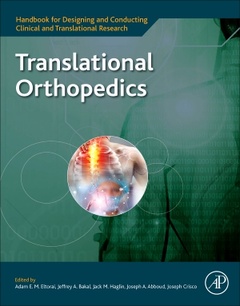Translational Orthopedics Designing and Conducting Translational Research Handbook for Designing and Conducting Clinical and Translational Research Series
Coordonnateurs : Bakal Jeffrey A., Haglin Jack M., Abboud Joseph, Crisco Joseph J., Eltorai Adam E.M.

Translational Orthopedics: Designing and Conducting Translational Research covers the principles of evidence-based medicine and applies these principles to the design of translational investigations. Readers will come to fully understand important concepts, including case-control study, prospective cohort study, randomized trial, and reliability study. Medical researchers will benefit from greater confidence in their ability to initiate and execute their own investigations, avoid common pitfalls in translational orthopedics, and know what is needed in collaboration. Further, this title is an indispensable tool in grant writing and funding efforts. The practical, straightforward approach helps the aspiring investigator navigate challenging considerations in study design and implementation. The book provides valuable discussions of the critical appraisal of published studies in translational orthopedics, allowing the reader to learn how to evaluate the quality of such studies with respect to measuring outcomes and to make effective use of all types of evidence in patient care. In short, this practical guidebook will be of interest to every Medical Researcher or Orthopedist who has ever had a good clinical idea but not the knowledge of how to test it.
Preface Adam E. M. Eltorai Introduction 1. Introduction 2. Translational Process 3. Scientific Method 4. Basic research PRE-CLINCIAL 5. Overview of Preclinical Research 6. What Problem are you Solving? 7. Types of Interventions 8. Drug discovery 9. Drug Testing 10. Device discovery and prototyping 11. Device testing 12. Diagnostic Discovery 13. Diagnostic Testing 14. Other Product Types 15. Procedural Technique Development 16. Behavioral Intervention CLINICAL: FUNDAMENTALS 17. Introduction to clinical research 18. The question 19. Study population 20. Outcome measurements 21. Optimizing the question STATISTICAL PRINCIPLES 22. Common issues in analysis 23. Basic statistical principles 24. Distributions 25. Hypotheses and error types 26. Power 27. Regression 28. Continuous variable analyses 29. Categorical variable analyses 30. Analysis of variance 31. Correlation 32. Biases 33. Basic science statistics CLINICAL: STUDY TYPES 34. Design principles 35. Case series 36. Case-control study 37. Cohort study 38. Cross-section study 39. Longitudinal Study 40. Clinical trials 41. Meta-analysis 42. Cost effectiveness study 43. Diagnostic test evaluation 44. Reliability study 45. Database studies 46. Surveys and questionnaires 47. Qualitative methods and mixed methods CLINICAL TRIALS 48. Randomized control 49. Nonrandomized control 50. Historical control 51. Cross-over 52. Withdrawal studies 53. Factorial design 54. Group allocation 55. Hybrid design 56. Large, pragmatic 57. Adaptive 58. Randomization 59. Blinding 60. Multicenter considerations 61. Registries 62. Phases of Clinical Trials 63. IDEAL Framework 64. Artificial Intelligence 65. Patient Perspectives CLINICAL: PREPARATION 66. Sample size 67. Budgeting 68. Ethics and review boards 69. Regulatory considerations for new drugs and devices 70. Funding approaches 71. Subject recruitment 72. Data management 74. Statistical Software 75. Report forms 76. Subject adherence 77. Survival analysis 78. Monitoring committee in clinical trials REGULATORY BASICS 79. FDA Overview 80. IND 81. New drug application 82. Devices 83. Radiation-emitting Electronic Products 84. Orphan Drugs 85. Biologics 86. Combination Productions 87. Foods 88. Cosmetics 89. CMC and GxP 90. Non-US regulatory 91. Post-market drug safety monitoring 92. Post-market device safety monitoring CLINICAL IMPLEMENTATION 93. Implementation Research 94. Design and Analysis 95. Mixed Methods Research 96. Population- and setting-specific implementation PUBLIC HEALTH 97. Public Health 98. Epidemiology 99. Factors 100. Good questions 101. Population- and environmental-specific considerations 102. Law, policy, and ethics 103. Healthcare institutions and systems 104. Public health institutions and systems Practical Resources 105. Presenting data 106. Manuscript preparation 107. Building a team 108. Patent basics 109. Venture pathways 110. SBIR/STTR 111. Sample forms and templates
Dr. Abboud is a Board Certified Orthopaedic Surgeon and specializes in the treatment of patients with shoulder and elbow disorders. He is an internationally recognized authority on the treatment of shoulder and elbow disorders. He is a Professor of Orthopaedic Surgery at the Sidney Kimmel Medical College of Thomas Jefferson University and a core member of the teaching faculty for Rothman Orthopaedics. Dr. Abboud received his medical degree with honors from Georgetown University School of Medicine and went on to complete his residency in Orthopaedic surgery at the Hospital of the University of Pennsylvania where he served as the administrative chief resident and received the award. He subsequently completed two (one-year) fellowships at the University of Pennsylvania in Shoulder and Elbow surgery and Orthopaedic Biomechanics. Dr. Abboud has published over 250 peer reviewed publications, given over 600 invited lectures nationally and internationally, and published several textbooks and numerous book chapters. He has received the presti
- Focuses on the principles of evidence-based medicine and applies these principles to the design of translational investigations within orthopedics
- Provides a practical, straightforward approach that helps investigators navigate challenging considerations in study design and implementation
- Details discussions of the critical appraisal of published studies in translational orthopedics, supporting evaluation with respect to measuring outcomes and making effective use of all types of evidence in patient care
Date de parution : 04-2024
Ouvrage de 578 p.
21.4x27.6 cm
Thème de Translational Orthopedics :
Mots-clés :
<; p>; Pathophysiology; Orthopedics; Biological Therapies; Science Statistics; Biases; IRB Protocols; Clinical Trials<; /p>



